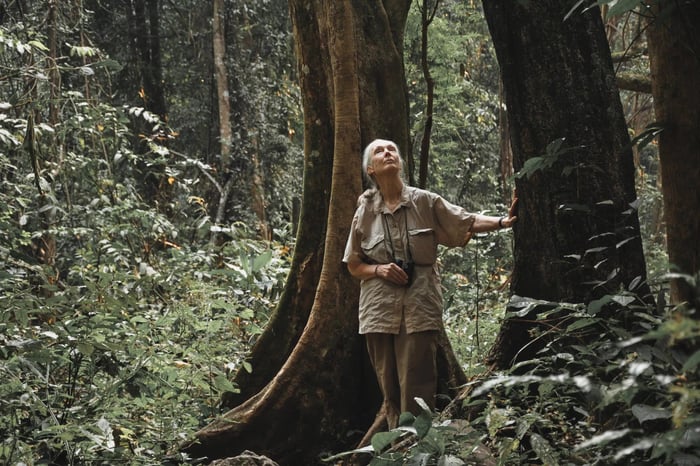 Photo: Jane Goodall Institute
Photo: Jane Goodall Institute
At 87 years old, famed primatologist Jane Goodall has filled her schedule for at least the next nine years. She’s just launched Trees for Jane, a global initiative aimed at planting a trillion trees around the world by 2030. That’s a 33 percent increase in the world’s current tree populations or about 128 trees for every person on the planet.
“I know that a trillion sounds like an insane number,” Jeff Horowitz, Trees for Jane’s co-founder, told National Geographic. “We’re not saying flat out that we’ll be able to succeed, but we want to come as close as we can.”
Trees for Jane
The program is built around existing efforts. Horowitz estimates it will be working with hundreds of organizations already planting trees.
Trees for Jane will also work to protect existing forests “because those big trees already have stored CO2,” Goodall said.
See also: How Room to Read has impacted the lives of 23 million children
“Trees absorb carbon dioxide. They give us oxygen. They help to make rain. So they are a gift,” she said.
It’s impossible to get an exact number, but best guesses but the total tree population on Earth at around three trillion. An estimated 15 billion trees are lost every year to deforestation, fires, and natural causes. But that number used to be much higher.
 Photo: Vlad Hilitanu
Photo: Vlad Hilitanu
“Colonialism and the industrial revolution created a global extraction economy with little regard for the natural systems that sustain all life,” Goodall and Horowitz explain in an op-ed for Time Magazine.
“And one of the most tragic consequences of this extractive economy is the staggering loss of half the planet’s trees. Where once our planet was home to 6 trillion trees, only 3 trillion remain. And half of that loss has occurred in only the past 100 years—barely a blink of an eye considering the millions of years it took to create Earth’s biodiverse landscapes.”
According to Goodall and Horowitz, this “willful destruction” of forests is so much more consequential than most people realize. “Trees, forests, and all plant life have a crucial role in balancing and maintaining the cycles of life on our planet. They provide food, water, shelter and medical cures. They create the oxygen we breathe and absorb the carbon dioxide that threatens our climate. Deforestation and other land-use disruptions account for a staggering 23 percent of the world’s greenhouse gas emissions.”
They say that between record-setting forest loss and recent warnings about the rapidly ticking climate clock, “protecting and restoring our forests must become one of the highest of our planetary priorities.” These types of natural climate solutions can deliver “up to one-third of the emission reductions needed by 2030.”
The climate crisis
The Trees for Jane announcement, which also includes the film A Trillion Trees, comes on the heels of a U.N. warning last Friday that current efforts to slow climate change aren’t extensive enough to meet Paris Agreement targets. Trees for Jane’s launch is part of the UN’s Climate Action Week. Goodall is a UN ambassador for peace.
Trees for Jane says it plans to work in Africa and throughout the developing world, including projects to protect the Gombe forest in Tanzania where Goodall conducted her groundbreaking research on chimpanzees more than sixty years ago.
 Photo: Jane Goodall Institute
Photo: Jane Goodall Institute






